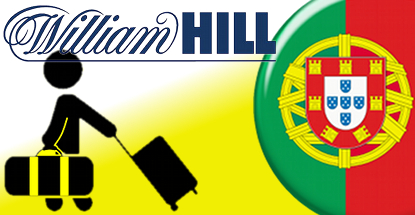 UK-listed online bookmakers William Hill are withdrawing from Portugal and Estonia following “recent regulatory developments.”
UK-listed online bookmakers William Hill are withdrawing from Portugal and Estonia following “recent regulatory developments.”
Hills’ affiliates received emails on Wednesday indicating that the company would “cease to accept business from customers in Estonia and Portugal” starting Sunday, June 28. Following that date, players will be able to withdraw their account balances but “none of William Hill’s products will be available” in those countries.
Hills instructed its affiliates to remove all marketing materials relating to Estonian and Portuguese bettors. Hills said it was “obliged” to take this step “for the time being” but said it was “confident that we will have the opportunity to work together in the future.”
PORTUGAL LAYS OUT NEW ONLINE REGIME TIMELINE
Hills’ withdrawal from Portugal comes just as the country prepares to implement its new online gambling regime, which takes effect on Monday (29). The following day, the Turismo de Portugal website will post game technical system requirements, game rules and the like. A 10-day public comment period will follow. July 8 will bring publication of the final documentation and interested operators can begin submitting their games for certification about two to three weeks later.
By September, Turismo de Portugal will make available application forms for operators interested in participating in the country’s regulated market. Four types of licenses are available: casino games, fixed-odds sports betting, fixed-odds and pari-mutuel horse betting, and bingo. There is no limit on the number of licenses that will be granted and operators can apply for more than one license.
However, Portugal’s tax plans will likely keep applications from international operators to a minimum. Casino and poker revenue will be taxed between 15% and 30% depending on an operator’s annual income, while fixed-odds sports betting is being taxed at 8% of turnover on the first €30m in wagers, rising to 16% if turnover exceeds that sum. A PricewaterhouseCoopers study estimated that the tax plan could convince 80% of Portugal’s newly licensed operators to exit the market in its first year.
Despite that dire forecast, Portugal doesn’t intend to follow the lead of so many other European regulated markets by publishing a blacklist of unauthorized operators. Instead, Portugal will publish a list of operators holding Portuguese licenses. No doubt Portugal has taken note of other countries’ abject failure to keep pace with the endless number of mirror sites internationally licensed operators have deployed to circumvent these ineffectual protectionist impulses.
